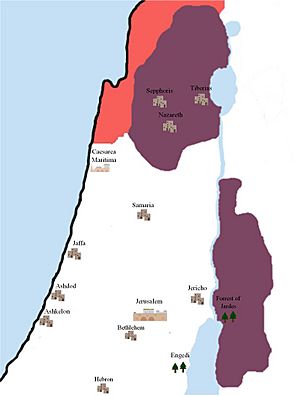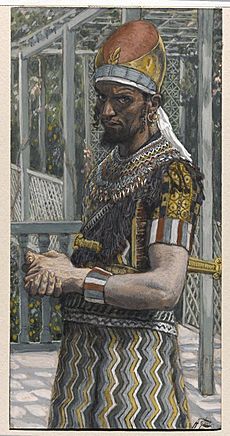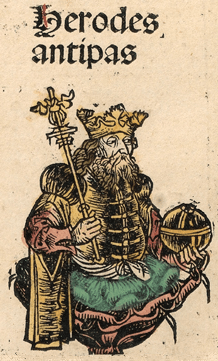Herod Antipas facts for kids
Quick facts for kids Herod Antipas |
|
|---|---|
| Tetrarch of Galilee and Perea | |
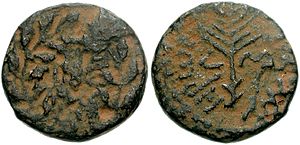
Coin of Herod Antipas
|
|
| Reign | 4 BC – 39 AD |
| Predecessor | Herod the Great |
| Successor | Agrippa I |
| Born | Before 20 BC |
| Died | After AD 39 Gallia |
| Wives |
|
| Dynasty | Herodian Dynasty |
| Father | Herod the Great |
| Mother | Malthace |
Herod Antipas (born around 20 BC, died after 39 AD) was an important ruler in the 1st century. He governed the regions of Galilee and Perea. His title was tetrarch, which means "ruler of a quarter" of a region. In the New Testament, he is sometimes called "Herod the Tetrarch" or even "King Herod," even though he was never officially a king.
Herod Antipas was a son of Herod the Great, a famous king. He is well-known today because of stories in the New Testament that describe his part in the events leading to the deaths of John the Baptist and Jesus of Nazareth.
After his father, Herod the Great, died in 4 BC, the Roman emperor Augustus recognized Herod Antipas as a tetrarch. He ruled Galilee and Perea as a client state of the powerful Roman Empire. This meant he governed his land but was still under Roman control. He built new cities and improved others, like Sepphoris and Betharamphtha. He also built his capital city, Tiberias, on the western shore of the Sea of Galilee. He named it after the Roman emperor Tiberius. Later, Tiberias became a key center for Jewish learning.
Antipas ended his first marriage to Phasaelis, the daughter of King Aretas IV of Nabatea. He then married Herodias, who had been married to his half-brother. According to the New Testament, John the Baptist spoke out against this marriage, which led Antipas to have him arrested and later put to death. This marriage also caused problems with King Aretas, leading to a war that Antipas lost. In 39 AD, Antipas was accused of plotting against the new Roman emperor, Caligula. Caligula sent him away to Gaul (modern-day France), where he later died.
The Gospel of Luke says that when Jesus was arrested in Jerusalem, he was first brought before Pontius Pilate, the Roman governor. Pilate then sent Jesus to Antipas, because Jesus had spent most of his time in Antipas's territory. However, Antipas sent Jesus back to Pilate.
Contents
Early Life and Family
Herod Antipas was a son of Herod the Great, who was the king of Judea. His mother was Malthace, who came from Samaria. Herod Antipas, along with his brothers Archelaus and Philip, studied in Rome.
Antipas was not his father's first choice to be king. But after some of his older brothers were no longer in line for the throne, Herod the Great changed his will. In the end, Herod Antipas was chosen to rule Galilee and Perea as a tetrarch. His brother Archelaus became the ruler of Judea, and Philip received other territories, also as a tetrarch.
Because Judea was a Roman client kingdom, the Roman emperor Augustus had to approve Herod the Great's plans for his sons. Augustus mostly agreed with Herod's final wishes, confirming Antipas as tetrarch of Galilee and Perea.
Herod Antipas's Reign
After his father's death in 4 BC, Antipas became the tetrarch of Galilee and Perea. He ruled these areas for 42 years. These two regions were separated by another area called the Decapolis.
Antipas decided to build and improve cities, just like his father had done. He rebuilt and made Sepphoris stronger. He also added a wall to Betharamphtha in Perea, which he renamed Livias. His most famous building project was his capital city, Tiberias, on the western shore of the Sea of Galilee. He named it to honor Emperor Tiberius. The city had warm springs nearby for bathing, and by the time of the First Jewish-Roman War, it had a stadium, a royal palace, and a place for prayer. Tiberias later became a very important center for Jewish learning. However, many religious Jews at first did not want to live there because it was built over an old graveyard, which they considered ritually unclean. So, Antipas had to bring in people from other places, poor people, and freed slaves to live there.
Antipas also showed respect for Jewish traditions. For example, his coins did not have any images, which would have gone against Jewish rules about idolatry. When Pontius Pilate, the Roman governor of Judea, caused problems by placing special shields in Jerusalem, Antipas and his brothers successfully asked for them to be removed.
John the Baptist and Jesus
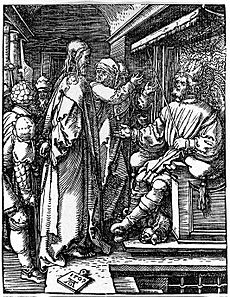
Marriage and Conflict
Early in his rule, Antipas married the daughter of King Aretas IV of Nabatea. However, during a visit to Rome, he met and fell in love with Herodias, who was married to his half-brother. Antipas and Herodias decided to marry after Antipas ended his first marriage. When Aretas's daughter found out, she went back to her father. This caused a war between Antipas and Aretas, which Antipas lost.
John's Message and Death
Antipas faced more problems when John the Baptist began preaching and baptizing people near the Jordan River. The New Testament says that John spoke out against Antipas's marriage, saying it was against Jewish law. Because of this, John was put in prison in Machaerus and later put to death. The Gospels of Matthew and Mark say that Antipas did not want to kill John but was convinced to do so by Herodias's daughter, Salome, after she danced for him at his birthday party. He had promised her anything she wanted, up to half his kingdom.
Jesus's Ministry and Trial
Jesus of Nazareth was one of the people baptized by John. Jesus then began his own teachings in Galilee. According to Matthew and Mark, Antipas worried that John had come back to life. The Gospel of Luke says that some Pharisees warned Jesus that Antipas wanted to kill him. Jesus called Antipas a "fox" and said that a prophet would not die outside of Jerusalem.
Luke's Gospel also describes Antipas's role in Jesus's trial. Pilate, knowing that Jesus was from Galilee and thus under Antipas's rule, sent Jesus to Antipas, who was also in Jerusalem at the time. Antipas was happy to see Jesus, hoping to see him perform a miracle. But when Jesus remained silent, Antipas made fun of him and sent him back to Pilate. Luke says that after these events, Pilate and Antipas became friends, even though they had been enemies before.
Later Years of Rule
Between 34 and 36 AD, the conflict with Aretas of Nabatea, caused by Antipas's marriage and disagreements over land, turned into a full war. Antipas's army was badly defeated. He had to ask Emperor Tiberius for help. Tiberius ordered the Roman governor of Syria, Lucius Vitellius, to fight Aretas. However, Vitellius learned that Tiberius had died in 37 AD and decided not to go to war.
Exile and Death
Antipas lost his power because of Emperor Caligula and his own nephew, Agrippa I. Agrippa, Herodias's brother, had become friends with Caligula. When Caligula became emperor in 37 AD, he gave Agrippa a kingdom and the title of king.
Josephus, an ancient historian, tells us that Herodias was jealous of Agrippa's success. She convinced Antipas to ask Caligula for the title of king for himself. However, Agrippa also told the emperor that Antipas was plotting against him. As proof, Agrippa said that Antipas had enough weapons for 70,000 men. When Antipas admitted to having the weapons, Caligula believed the accusations. In the summer of 39 AD, Antipas's money and land were given to Agrippa, and Antipas was sent away. He was exiled to a city in Gaul (modern-day France).
Herod Antipas died while in exile.
Legacy
Some followers of Jesus mentioned in the New Testament, like Joanna (the wife of one of Antipas's officials) and Manaen (a close companion of Antipas), might have been sources of information about Antipas and his court for early Christians. Antipas is a very important figure in the New Testament because of his connection to the deaths of John the Baptist and Jesus.
Herod Antipas has appeared in many movies and plays about the life of Jesus. He was played by Frank Thring in King of Kings (1961), José Ferrer in The Greatest Story Ever Told (1965), and Christopher Plummer in Jesus of Nazareth (1977). Sometimes, as in Jesus Christ Superstar (1973) and The Passion of the Christ (2004), Antipas is shown as being easily influenced. This idea might come from how his wife Herodias influenced him, and from Jesus calling him a "fox."
He also appears in the 1953 film Salome, where he is played by Charles Laughton. In this movie, Salome's mother, Herodias, uses her daughter's dancing to get Herod's permission to execute John the Baptist.
Family tree
| Aretas IV King of Arabia |
|||||||||||||||||
| Phasaelis | Herod Antipas | ||||||||||||||||
| Simon Boethus (High Priest) |
Alexander I | Alexandra | Antipater the Idumaean |
Cypros (Nabatean) |
|||||||||||||||||||||||||||||||||||||||||||||||||||||||||||||||||||||||||||
| Aristobulus III d. 35 BCE |
|||||||||||||||||||||||||||||||||||||||||||||||||||||||||||||||||||||||||||||||
| Doris | Cleopatra of Jerusalem |
Mariamne II | Mariamne I d. 29 BCE |
Malthace (Samaritan) |
Herod the Great |
Salome I | Phasa'el | Pheroras | Joseph | ||||||||||||||||||||||||||||||||||||||||||||||||||||||||||||||||||||||
| Alexander II d. 7 BCE |
|||||||||||||||||||||||||||||||||||||||||||||||||||||||||||||||||||||||||||||||
| Berenice (daughter of Salome I) |
Aristobulus IV d. 7 BCE |
||||||||||||||||||||||||||||||||||||||||||||||||||||||||||||||||||||||||||||||
| Herod II | Herodias | Herod Antipas | Mariamne III | Herod Archelaus | Glaphyra | Olympias | Joseph ben Joseph | ||||||||||||||||||||||||||||||||||||||||||||||||||||||||||||||||||||||||
| Philip the Tetrarch d. 34 CE |
Salome | Aristobulus of Chalcis | |||||||||||||||||||||||||||||||||||||||||||||||||||||||||||||||||||||||||||||
| Antipater II d. 4 BCE |
|||||||||||||||||||||||||||||||||||||||||||||||||||||||||||||||||||||||||||||||
See also
 In Spanish: Herodes Antipas para niños
In Spanish: Herodes Antipas para niños
- Herodian dynasty
- Herodian kingdom
- List of biblical figures identified in extra-biblical sources
 | Roy Wilkins |
 | John Lewis |
 | Linda Carol Brown |


